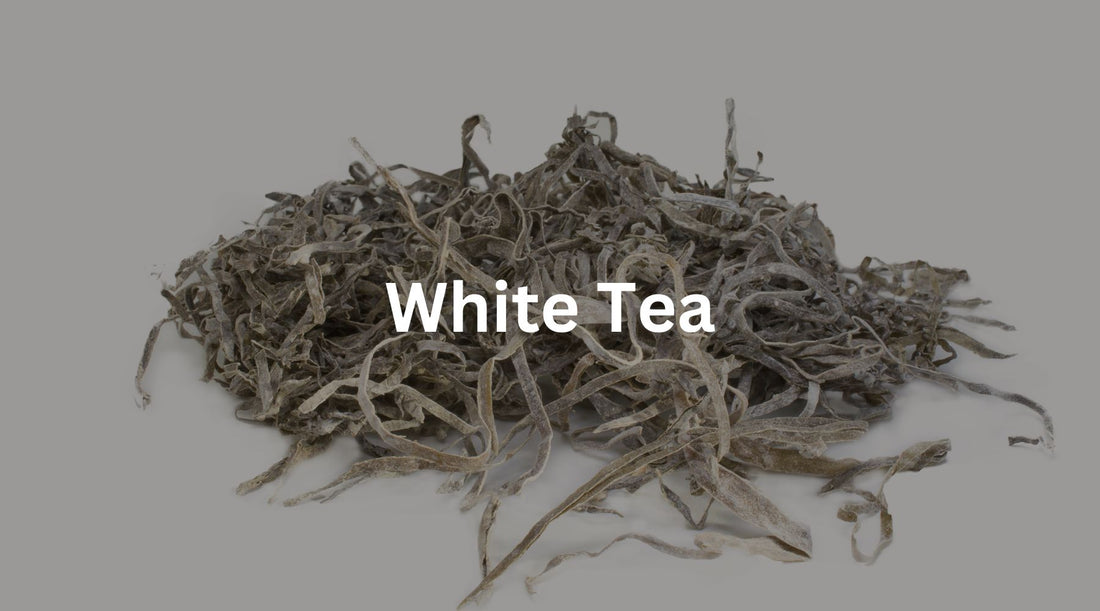If you're looking for a soothing and refreshing drink that can also boost your health, you might want to try white tea. White tea is one of the least processed types of tea, which means it retains more of its natural antioxidants and nutrients.

What is white tea?
White tea is made from the young buds and leaves of the Camellia sinensis plant, the same plant that produces green, black, and oolong teas. The name "white" comes from the fine white hairs that cover the buds, giving them a silvery appearance. Unlike other teas, white tea is not rolled or oxidized, which means it undergoes minimal processing and preserves more of its natural flavor and aroma.
White tea has a delicate and subtle taste, with floral, fruity, or sweet notes. It can be brewed with hot or cold water, depending on your preference. The ideal brewing temperature for white tea is around 80°C (176°F), and the steeping time is usually between 2 to 5 minutes. You can also re-steep the same leaves multiple times, as they will release different flavors with each infusion.
What are the benefits of white tea?
White tea has many health benefits, thanks to its high content of antioxidants and polyphenols. These compounds can help protect your cells from oxidative stress and inflammation, which are linked to various chronic diseases and aging. Some of the benefits of white tea include:
Improving your immune system
White tea can help boost your immune system by stimulating the production of natural killer cells, which are responsible for fighting off infections and viruses. White tea can also help prevent bacterial and fungal growth, as it has antibacterial and antifungal properties.
Enhancing your skin health
White tea can help improve your skin health by reducing the signs of aging, such as wrinkles, sagging, and spots. White tea can also help protect your skin from sun damage, as it can inhibit the enzymes that break down collagen and elastin, which are essential for maintaining your skin's elasticity and firmness.
Promoting your heart health
White tea can help lower your blood pressure and cholesterol levels, which are risk factors for heart disease and stroke. White tea can also help improve your blood circulation and prevent blood clots, as it can prevent the oxidation of LDL (bad) cholesterol and enhance the production of nitric oxide, a molecule that relaxes your blood vessels.
Protecting your brain health: White tea can help prevent cognitive decline and neurodegenerative diseases, such as Alzheimer's and Parkinson's. White tea can also help improve your memory and learning abilities, as it can stimulate the growth of new brain cells and synapses.

What is the history of white tea?
White tea has a long and rich history that dates back to ancient China. According to legend, white tea was discovered by accident when an emperor named Shen Nong was boiling water under a wild tea tree. A few leaves fell into his pot and infused the water with a pleasant aroma and flavor. The emperor was impressed by the drink and decided to cultivate the plant for his personal use.
White tea was considered a rare and precious commodity in China, as it was only produced in small quantities and reserved for the imperial court. White tea was also used as a tribute to foreign dignitaries and a symbol of honor and respect. White tea was not widely known or consumed outside of China until the 19th century, when it was introduced to Europe by traders and explorers.
What is the cultural significance of white tea?
White tea has a special cultural significance in China, as it is associated with purity, elegance, and simplicity. White tea is often used in ceremonies and rituals, such as weddings, funerals, birthdays, and anniversaries. White tea is also considered a spiritual drink that can enhance one's meditation and mindfulness.
White tea is appreciated by connoisseurs and enthusiasts around the world for its exquisite quality and craftsmanship. White tea is often graded according to its origin, harvest time, plucking standard, and processing method. Some of the most famous varieties of white tea include:
Silver Needle: This is the highest grade of white tea, made from only the unopened buds of the plant. It has a pale yellow color and a sweet floral flavor.
White Peony: This is the second highest grade of white tea, made from one bud and two young leaves. It has a light green color and a fruity flavor.
Long Life Eyebrow: This is a lower grade of white tea, made from the leftover leaves and buds that are not used for the higher grades. It has a dark yellow color and a nutty flavor.

How do I prepare white tea?
There are many different types of white tea and thus many different qualities to pay attention to. We use Organic Shu Mee White Tea in our tea blends for its more pronounced taste profile and oolong like tea flavor. It is made primarily of naturally withered upper leaf and tips contributing to its mellow, slightly nutty taste.
To prepare white tea and white tea blends, we recommend the following.
- 1 - 2 teaspoons of loose leaf white tea.
- 8oz of preferred water
- Water temp of 160-185.
- Steep time: 3-6 minutes depending on flavor preference (we like 2-3 minutes)
- Re-steeping allowed.
White tea is a wonderful drink that can offer you many benefits and pleasures. If you're interested in trying white tea, you can find it online or in specialty tea shops. You can also experiment with different brewing methods and flavors to suit your taste and mood. Thank you for reading and happy sipping!
Options
When it comes to picking the right tea for the right moment, it is really up to your preferences.
Our blend with White Tea is called Perky Tea. We use organic Shu Mee to build a powerful blend of herbs to lift you up.
Protect Your Health
When it comes to your health, there is nothing more important. Reach out to your health care provider before taking any herbs. The information provided here is for educational purposes only and is not intended to diagnose, treat, or cure anything. We wish you the best in your journey to health.
Citations
- Antioxidant and potential anti-inflammatory activity of extracts and formulations of white tea, rose, and witch hazel on primary human dermal fibroblast cells. Link
- Anti-Stress, Behavioural and Magnetoencephalography Effects of an L-Theanine-Based Nutrient Drink: A Randomised, Double-Blind, Placebo-Controlled, Crossover Trial Link
- Meta-Analysis of the Association between Tea Intake and the Risk of Cognitive Disorders Link
- A meta-analysis of tea drinking and risk of Parkinson's disease Link
- Antioxidant and potential anti-inflammatory activity of extracts and formulations of white tea, rose, and witch hazel on primary human dermal fibroblast cells - Link
- White tea (Camellia sinensis Kuntze) exerts neuroprotection against hydrogen peroxide-induced toxicity in PC12 cells - Link
- Free radicals, antioxidants in disease and health - Link
- Plant polyphenols as dietary antioxidants in human health and disease Link
- White tea: A contributor to oral health Link
- Studies on tea and health - Link
- Catechin intake might explain the inverse relation between tea consumption and ischemic heart disease: the Zutphen Elderly Study Link

